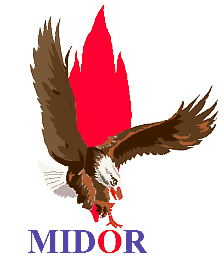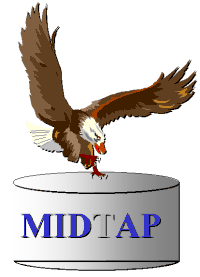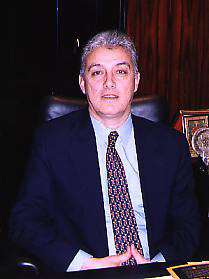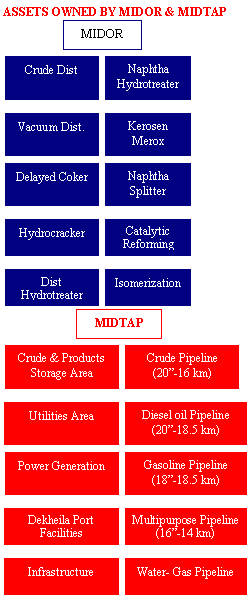
|

 |
  MIDDLE EAST OIL REFINERY (MIDOR) MIDDLE EAST OIL REFINERY (MIDOR)
|
  MIDDLE EAST OIL TANKAGE & PIPELINES (MIDTAP) MIDDLE EAST OIL TANKAGE & PIPELINES (MIDTAP)
|

Read our Interview. |
"An Egyptian Vision for the Next Millenium"
Manager:
Mr. Sameh S. Fahmy,
Vice-Chairman & CEO MIDOR,
Chairman & CEO MIDTAP
Contact:
Midor :
22 El Badia St., Heliopolis, Cairo, Egypt
Tel: (202) 4195501/02
Fax: (202) 4145936
E.mail: midor@egyptonline.com
Midtap :
22 El Badia St., Heliopolis, Cairo, Egypt
Tel: (202) 4195501/02
Fax: (202) 4197592
E.mail: midtap@egyptonline .com |
 Strategy Strategy
 1/ Company Profile : MIDOR Refinery 1/ Company Profile : MIDOR Refinery
MIDOR refinery is a modern environmentally friendly grass-root refinery in close proximity to the (SUMED) pipeline terminal at Sidi Krir and Dekheila port in Alexandria.
The project investment is around $1.2 billion.
The refinery is designed to process 5 million tons of crude oil annually.
Its processing scheme is based upon high conversion processes to maximize middle distillate products, applying licenses from UOP and Conoco –Bechtel.
Ownership of the refinery's in fence facilities is divided between MIDOR and MIDTAP.
The process units are owned by MIDOR whereas the utilities and offsite facilities are owned by MIDTAP.
MIDOR refinery is a very successful example of the cooperation between the Egyptian government and the private sector. MIDOR is a state of the art refinery. The philosophy of this refinery is based on establishing a profitable economic project adhering to all the environmental regulations and using the latest scientific and technological methods to provide the maximum flexibility in operating to suit the fluctuating market trends.
 Refinery’s units: Refinery’s units:
The refinery consists of the following units:
Crude & vacuum distillation *Hydrocracker (U.O.P)
Hydrotreater * Kerosene Merox(U.O.P)
Catalytic reforming (U.O.P) * Gas recovery unit(U.O.P)
Services and utilities unit *Sulfur recovery units
Delayed coker (Conoco-Bechtel) *Naphtha hydrotreater(U.O.P)
Naphtha splitter (U.O.P) * Isomerization (U.O.P)
Claus unit
 Products: Products:
MIDOR Refining capacity is 100.000 BBL/Day.
The refinery produces a high quality petroleum products such as :
-L.P.G
-Unleaded gasoline high octane
-Low sulfur Kerosene/jet fuel
-Green coke
-PURE Sulfur
-Low sulfur diesel
The refinery is designed to convert heavy products of low economic value into middle distillates of high economic value, as (LPG, Naphtha, and Diesel).
MIDOR refinery benefits from gas oil and converts it into high quality products like Naphtha and Kerosene.
 ASSETS OWNED BY MIDOR & MIDTAP ASSETS OWNED BY MIDOR & MIDTAP

Project ‘s contractors:
The general contractor is Technip, which is a French company. The subcontractors are Egyptian, Spanish, Korean and German. The technology is American.
Shareholder Structure:
Egyptian General Petroleum corporation (EGPC)40%(EGYPT)
MEDOR (Ireland) 20%.
NBE Finance (Cayman) 16%.
Petroleum Projects and Technical Consultation company (PETROJET) 10% ( EGYPT)
Engineering for the Petroleum and Process Industries (ENPPI) 10% (EGYPT).
MASAKA (Switzerland) 2%.
Suez Canal Bank (EGYPT) 2%.
Administration:
Chairman &C.E.OHussein Salem
Vice Chairman&C.E.OEng. Sameh Fahmy
General Managers:
Financial & EconomicsHassan Mohamed Madkour
Admin. General managerGamal Mohamed Kamal
Legal Affairs ExpertAbd El Mohsen El Sabaa
Maintenance ExpertHany EL Shoubashy
Crude oil & products movementMostafa Nosrat
Follow-up ExpertMohamed Ismail Metawea
Local trade ExpertMagdy Abd El Rahman
Production Services ExpertMohamed Tawfeek El Ganagy
 2/ Company Profile : MIDTAP 2/ Company Profile : MIDTAP
MIDTAP (Middle East Tankages & Pipelines) is the first private sector company in Egypt established to carry out infrastructure facilities for refineries under BLT system. MIDTAP is constructing storage areas, offsite utilities , and infrastructure projects for MIDOR. MIDTAP is also constructing crude oil and products tanks (50 tanks) and pipelines to transfer crude oil & products (8 pipelines) with various lengths and radii, working automatically using the latest technologies, aiming at granting administrative, operational, technical and maintenance support for MIDOR.
The capital investment of MIDTAP is 400 million $.
MIDTAP will facilitate crude oil transportation from SUMED terminal to the refinery, and product transportation from the refinery to Dekheila port in Alexandria. MIDTAP also will coordinate between MIDOR refinery and other refineries in Egypt.
The Dekheila port is 18.5 Kms from MIDOR Refinery and has 7 piers .The marine and offshore facilities of the port are divided into a marine pier for exporting petroleum products and an offshore facilities area. The marine pier is 300 meters in length and 40 meters in width, whereas the depths of the pier range from 13 to 18 meters, and the technical preparations are:
6 loading arms for the various petroleum products.
4 pipelines 20 inch in diameter to transfer the products to the shipping area.
A fire extinguishing station that possesses the latest equipment.
Preparations for transferring, shipping and unloading the petroleum coke in the specialized vessels.
Tanking mooring facilities.
Shareholder Structure:
ENPPI . (EGYPT) 40%.
Misr Bank (EGYPT) 20%.
The Egyptian Investment Projects (EIP) EGYPT 20%.
National Bank Finance (Cayman) 12.5%.
National Bank of Egypt 4%.
MASAKA (Switzerland) 3.5%.
ADMINISTRATION:
1- Chairman & C.E.O Eng. Sameh Fahmy
2- Vice Chairman &C.E.O Mr.Hussein Salem
Chairman’s Narrative Biography:
NAME: Eng. Amin Sameh Samir Fahmy
Educational History:
B.Sc Chemical Engineering.(Cairo University-June 1973)
M.A. National Strategies &National Planning.(Nasser Academy-Dec.1988)
Employment history:
Egyptian General Petroleum Corporation (EGPC) Vice Chairman for Planning &Projects. (May 1993)
EGPC Planning General Manager.(Nov. 1988)
EGPC Project Economics Manager. (Nov.1987)
EGPC Plan Investments Manager. (Jan. 1985)
EGPC Project Planning Dept. (1973-1985)
General Experience:
7 years experience in Projects.
6 years experience in Projects Economics.
6 years in Planning
6 years experience in Strategic Planning & Projects.
GENERAL MANAGERS:
Administration General managerKamal El Din El Leithy
Expert / Project general managerEng . Mostafa Adam
Contracts & follow-up general managerSamia Abd-El Hafiz
Deputy Admin General managerMohamed Raof
Deputy financial & Economical affairsMohamed Abu Zeid
Security sector managerWahba Eisa
Projects sector managerEng. Tarek El Hadedy
Follow-up sector managerMagdy Anwar
MIDELEC
MIDELEC is established to supply the electricity needed to the refinery to secure more than one source of electricity.
MIDOR has signed a contract with MIDELEC in August 1998 with a total capacity of 124 MW.
Total investment of MIDELEC is $70.million
MIDWATER

MIDWATER is established under the BOOT scheme (Build Own Operate Transfer). The company is70% owned by the Italian Co. WTD (Water treatment Desalination) and 20% owned by MIDTAP.
The total capital of Midwater is $ 15 million
|
Petromaint:
Petromaint is an Egyptian shareholding company and is established originally to offer services including maintenance, training, consultations, and technical studies, in addition to evaluating and designing systems of maintenance, quality and technical aid systems in various production sectors inside & outside A.R.E for the petroleum industry.
The company ‘s authorized capital is136 million Egyptian Pound and the issued capital is 27 million Egyptian pound. The shareholders are The Housing and Social Services Fund, Egypt Gas ,Petrojet, Alexandria Petroleum Company, El – Amereya Oil Refinery Company, Egyptian Petrochemicals Company. MIDTAP owns 20% of the issued capital of Petromaint with a total value of 5.5 million Egyptian pound.
Location of MIDOR project:
The refinery was constructed near a sea / port to facilitate exporting refined products. The location of MIDOR near the Sumed Terminal and the free zone area will facilitate the transportation of crude oil to the refinery and the export of products.
Top of page
 INTERVIEW WITH INTERVIEW WITH
MR. SAMEH FAHMY
VICE CHAIRMAN & CEO OF MIDOR CHAIRMAN & CEO OF MIDTAP
February 2,1999
1/Q: Since MIDOR is a joint venture, could you give us the structure of the Middle East Oil refinery?

MIDOR is the first private oil refinery in Egypt since the early 1960s. Before the 1960s, Egypt had two oil refineries. MIDOR was established by two businessmen in the early 1990s but the project was not realized until 1996, when the Egyptian General Petroleum Corporation joined the venture. First, EGPC joined by 20% in 1995 upon request of the shareholders. Later on however, everyone discovered that 20% was not sufficient for the venture to proceed. Accordingly, EGPC joined by 60% in December 1996 represented by EGPC and two of its investment companies Petrojet and ENPPI. When EGPC increased its share to 60% there were some changes. First, the equity of the company was doubled which helped the company in attracting loans from local banks and gave credibility to the project. Second, EGPC decided to send 30 of its best employees in early 1997 besides myself, as I was originally Vice Chairman for Planning and Projects at EGPC. Now, MIDOR employs about
400 people, 100 of which come from the oil sector in Egypt, from about 30 companies. The shareholder structure is different now. EGPC, Petrojet and ENPPI own 60% and the National Bank of Egypt became a shareholder in 1998 and now owns 16%. These changes took place in
1998 and early 1999. The Suez Canal Bank also owns 2% of the shares. The original shareholders are still in the company. The number of shares, however, has changed. The project started to come into force on June 30th, 1997. Now we are about 45% in progress. We plan to start operation in October 2000. The general contractor is Technip, which is a French company. The subcontractors are Egyptian, Spanish, Korean and German while the technology is American. The project management is also American. The area of the site is about 500 acres situated in the free zone area in Alexandria. The refinery is a state-of-the-art ,technologically advanced refinery. It is, however environmentally friendly. There are 4 companies at present in addition to MIDOR related to the project namely MIDELEC, MIDWATER and MIDTAP which acquired a 20% share in the maintenance company Petromaint.
2/Q: What will be the production scheme of MIDOR?
We are going to produce very high quality products according to the standards and specifications of the European Union for the year 2000,2005 and 2010. We plan to follow any additional changes, if they occur.
3/Q: If my information is correct, 50% of production will go to the domestic market and the remaining 50% will go to exports?
Originally, the production was to be exported. Frankly speaking we would increase our earnings by selling to the domestic market, because we would be saving on transportation costs. We believe the local surrounding markets are shorter in distance and we would be competing with C&F product prices from abroad. The domestic market, we believe, will be like the EU in 10 years. It will be a simple, straightforward market.
- So, it is not due to the increase in demand in the domestic market?
We have 8 refineries in Egypt and MIDOR would be the ninth. So, there will be an increase in the quality of the products and an increase in the demand and consumption of high quality products. If this goes on we will be the leaders of the market because no one else can compete with the quality of our products unless upgrading projects are adopted and this means additional investments for competitors, i.e. finally oil prices will be more competitive. Now in Egypt we are exporting about 8 million tons of naphtha and fuel oil.
4/Q: "Though controversial at the beginning, it seems that MIDOR is heading towards success". Can you explain why?
I believed in the success of this venture from the first day. This is my personal opinion. I felt that the wave of privatization was gaining strength in Egypt. I have about 9 years of experience in strategic planning and therefore I can predict what is likely to happen in the future. I felt that it would be a success. On the other hand, some people could not conceive the idea that a private sector refinery could succeed in Egypt and how we could raise $1.5 billion dollars for the project. But, the conditions are changing in Egypt. We have a good banking system. We have good foreign currency reserves. Governments now believe that such ventures could succeed. Local banks are helping ventures like MIDOR. We are competing with other projects in the oil sector companies, but we are already many months ahead of them.

5/Q: According to the government’s plans, gas will be substituted for oil in order to dedicate oil for the lucrative export market. How did this affect your business?
It has not affected our business. It had some influence but still the refinery products will strongly compete with natural gas for at least 20-30 years.
6/Q: What is MIDOR ‘s policy on environmental issues?
It is a very important issue and one of MIDOR’s major concerns. We had a study prepared by an American-European company. We also received a grant from the US Government for completing and updating our study. Our policy is to keep our project environmentally friendly to the maximum extent. We have a very modern and sophisticated site in Alexandria. It is a pyramid refinery with 5 levels and 42 meters in height. It is different from any other refinery in the world.
7/Q: How do you think MIDOR could be locally affected by the progress in the world?
The local market can either be 10Km, 100 Km or 1000 Km in diameter. So, the more the local market increases, the better and more economical for MIDOR depending on the border situation between the neighboring countries.
8/Q: What about the states?
We plan to sell some of our gasoline to the USA. We are on our way to sell petroleum coke to an American company. We have some products that are sold completely to EGPC. There are other products that we have received offers for, although operations have not started yet. This is a good sign. Another good sign is that some shares were sold and the seller got a very good price for them. This means that people have faith in the management and future of the company.
9/Q: How would you be interested in attracting investors and businessmen?
MIDOR started in 1994 and then MIDTAP was established in 1996. MIDOR is the process area of the refinery while MIDTAP represents the utilities site, the storage facilities, the pipelines and port facilities. Now, we have MIDWATER, which is an Italian-Egyptian company. It is 60% Italian and 40% Egyptian. MIDWATER is responsible for providing MIDOR and MIDTAP with the necessary process water. We also have MIDELEC, which is an Egyptian company but is to be operated by a German company for 10 years. It will provide MIDOR, MIDTAP, MIDWATER, the free zone and some refineries in Alexandria with the necessary electricity. So, the success story of the company is on going and this should be enough to encourage investors to come and invest in this area. We are also thinking of establishing new companies by MIDTAP, MIDOR and their sister companies.
10/Q: What has been your most satisfying personal achievement since you have been appointed Vice-Chairman of MIDOR?
I have been appointed since January 1st, 1997. I am also Chairman of MIDTAP. I was very glad 10 days ago when I was informed that the first 4 towers, one of which is 30 meters in height, were erected at the site. We have 17 storage tanks that are almost finished. So, if you visit the site you will notice the achievement we’ve reached. I have never seen a project go that well, on a tight schedule and supported by highly qualified personnel including all contractors working on the job. Two years ago we did not have offices. Today, we have our own buildings for MIDOR and MIDTAP in Cairo and in Alexandria.
11/Q: Could you give us your personal background?
I am a chemical engineer. I graduated from the faculty of Engineering at Cairo University in 1973. I got my MA in national planning and national strategies in1988.
I worked for the Egyptian General Petroleum Corporation for 24 years, and was a member in various committees. I gained valuable experience in national, Arab and international cooperation.
12/Q: What is your personal opinion about the government reforms?
I think that they are remarkable and that is what I heard from several international experts , inside and outside Egypt. To my surprise, I heard that we are the second best market in attracting investments. This makes me very proud of our policies. I think that the oil sector is one of the most promising sectors with ambitious privatization plans among the industrial sectors in Egypt. These plans were initiated by the Egyptian government and foreign companies in the past 40 years. Even the oil sector always had foreign participation. We had American, Italian and European private companies. The largest oil fields in Egypt were discovered in the 1960s. AMOCO discovered the largest ever oil field in Egypt in 1964 in the Gulf of Suez ; the Morgan field. IFCO from Italy discovered a very huge field in the Delta area in 1965. We continued on these basis with other partners from Japan, France and Europe. Today, we have gained a very good experience in this field. That is why the oil sector in Egypt is distinguished among other industrial sectors.
13/Q: Keeping in mind that Forbes magazine reaches more than 4 million readers, what will your final message to them be?
I would like to welcome all of them to Egypt. And hopefully foreign investors will seize the opportunity to benefit from the continuously growing investment prospects in Egypt under the leadership of President Mubarak who believes very strongly in the benefits of privatization and is continuously taking all the necessary measures to achieve mega goals for the benefit of the Egyptians.
|
© World INvestment NEws, 1998.
This is the electronic edition of the special country report on Egypt published in FORBES Magazine,
May 31st issue.
Developed by AgenciaE.Tv |
|
|
|
|
|
|
|
|
|
|

